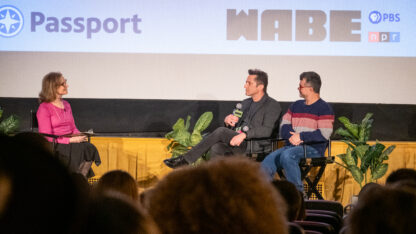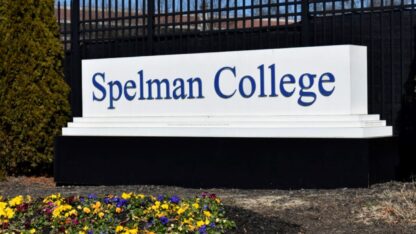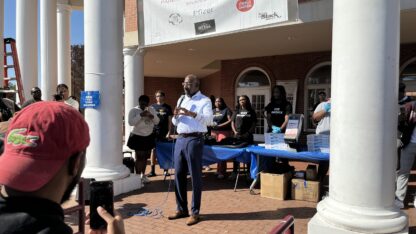On “City Lights,” we believe the arts provide a meaningful lens to view the world and that teaching is an art unto itself. Our new monthly series, “The Art of Teaching,” spotlights Georgia educators whose dedication and creative approach have a lasting impact on students, often inspiring them to turn their passions into professions.
To inaugurate this series, we chose Professor David Morrow, conductor of the Morehouse College Glee Club and Chair of the Department of Music at Morehouse. He joined “City Lights” host Lois Reitzes via Zoom to share his insights on teaching.
Interview highlights:
Leading a Glee Club whose legacy includes Dr. Martin Luther King:
“The Morehouse College Glee Club sang at Dr. King’s funeral that was held at Morehouse College. Many people know that there were two – one at Ebenezer Baptist Church and then later at Morehouse College the same day… (King) was only in the Glee Club, I’m told, a very short time, but the kinds of songs that were sung during the Civil Rights Movement were developed from the spirituals that African-Americans or enslaved Americans sang during that time… as we continue to look at how things are happening all over the world, and the legacy of peace that Dr. King tried to instill, the legacy of love that he tried to instill. All of these things are in our music, and so it’s very well intertwined.”
On exploring how past traditions inform more recent styles of music:
“It’s been my joy to keep the legacy going, but to… try to include newer things. I always tell students if you come to a school… knowing what you knew from the beginning – in other words, not ever having learned anything else new, or only doing what you already know – then we’ve sort of taken your money and taken your time, and not taken you anywhere,” said Morrow.
“So we try to include other kinds of music. I am a singer myself, and I love singing, so as a result, I try to do music that choirs can sing, actually,” he continued. “As we study the spiritual, for example, a favorite form is ‘call and response.’ Well, that’s seen in so many other kinds of music, from the blues licks that a guitarist plays with himself singing, just calling and responding there. Even in gospel styles, you have call-response between solos or the choir of soloists and the instrumentalists. So all of those things I like to blend together so that they see, while this is new, it also attaches itself to something old… We even go back to West Africa, in terms of the kinds of styles of music that were traditionally done there, and see how we make that segue into early African-American music.”
Dispelling some misapprehensions about what “Glee” music actually is:
“A ‘glee’ really is an English composition that comes out of the late Renaissance, early Baroque period, where it is a secular song and the best way to say it is that these were very often improvised songs. Some of them were created with the influence of a nice mug of beer, and they would get together and sing these wonderful songs. Usually, they were male choruses. That concept comes over to the United States and attaches itself to colleges and universities, and so it ends up not being the concert choir, but the sort of the ‘fun’ choir – not to say that the concert choir is no fun, not at all – but this was different music, and in fact, if you look at some of the early music that was sung by male glee clubs in the United States, they took the music very seriously, singing Renaissance music, singing settings of mixed choir choruses from oratorios… and it became a very serious organization. It also then became the catchall term for single-sex choirs.”
Glee Club field work to expand students’ ears beyond school walls:
“I think of a thing that we came up with; this is when I was assistant director under Dr. Wendall Whalum. He went to Hampton, Georgia to sing – to observe, rather – people who were singing shape notes,” recalled Morrow. “This is Black communities in rural Georgia at the time, and he would come back with wonderful ideas. He’d jot down things that he’d heard that were new. He’d make arrangements and try to have us sing some of those things. And I told him, ‘Why don’t we go there instead? And it’s just you going, why don’t you take the whole Glee Club so they can learn how to make these sounds, how this music sounds, how it comes from the folk tradition to the written tradition?’ We have been doing that consistently as well.”









